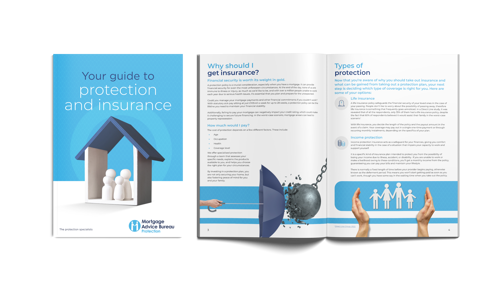What is protection?
Protection is a term used to describe different policies that can help keep you and your family protected should the worst happen.
As you go through life, your protection needs will change. It’s important to review your protection needs regularly - when you take out a new mortgage is the ideal time for this.
Life insurance
Life insurance gives you the comfort of knowing that your loved ones will be provided for in the event of your death. You can link a life insurance plan to a mortgage, which will pay out a lump sum.
Income protection
Income protection offers financial support if you’re unable to work due to illness or injury. It replaces part of your income and will continue to pay out regular, tax-free instalments until you’re able to return to work.
Critical illness cover
Critical illness cover is designed to look after you financially should you be unable to work due to diagnosis of a critical illness. Your specific illness needs to be covered under your policy in order to receive the tax-free lump sum that could be used to pay off your mortgage.
Buildings and contents insurance
Buildings and contents insurance covers the cost of repairing damage from unexpected events such as fire and flooding, and ensures that the lender’s assets are protected as well as your own. You will need buildings insurance as a minimum to be accepted for a mortgage, but we recommend you take out the contents part of the insurance too.
Family Income Benefit
Family Income Benefit is designed to provide your family with a regular, tax-free monthly income if you pass away or are diagnosed with a terminal illness. You can choose to pay either monthly or annual premiums for a set period. If the worst happens during this time, your loved ones will receive a consistent income to help replace any lost earnings.
Mover protection
If you’re unable to continue with either the buying or selling of a property due to circumstances outside of your control, then mover protection could help you recoup any costs you’ve already incurred.
Do I need life insurance to get a mortgage?
Life insurance is not a legal requirement to get a mortgage, however, we strongly advise that you consider having it. A mortgage is likely to be the biggest financial commitment you have, so it makes sense to protect it, especially if you have dependents such as a family who rely on your income to pay the mortgage.
The only insurance you need as a legal requirement to get a mortgage is buildings insurance.
Check your financial resilience with our risk assessment tool
See how well you're protected when life throws the unexpected at you.
Download our FREE protection guide
Get access to our jam-packed guide full of helpful information when you download. We'll also send you important industry news and information to keep you in the loop with what's happening in the mortgage industry.

Important information
For insurance business we offer products from a range of insurers.
Protection advice
Our advisers are committed to finding the right protection policies for you and to give peace of mind should the worst happen.
Bring proof of identity and any paperwork for any current policies you have in place. We also recommend preparing any questions you’d like to ask our advisers so that you get the most out of your time with them.
Latest articles:
What is Family Income Benefit?
Give your family the security of a regular income, no matter what.
Do I need life insurance to get a mortgage?
Ensure your family's future by understanding life insurance options when buying a house. Learn which policies are essential and which provide added peace of mind.
What is income protection insurance?
In an ever-changing world, prioritising the protection of your income is of vital importance if you become unable to work.
No posts currently available




